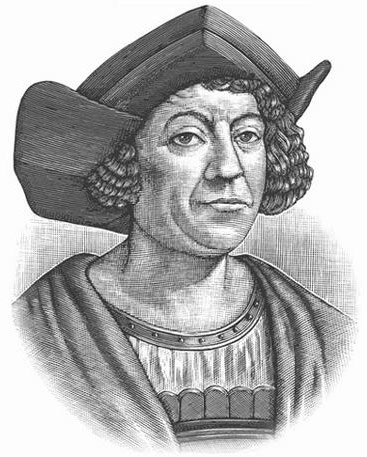Columbus: A Hero
1) Fernandez-Armesto, F. “Columbus–Hero or Villain?.” History Today, vol. 42, no. 5, May 1992, p. 4. EBSCOhost.
NOTE: “Finally, when we presume to judge someone from a long time ago, we should take into account the practical constraints under which they had to operate, and the limited mental horizons by which they were enclosed. Columbus was in some ways a man of extraordinary vision with a defiant attitude to the art of the possible. Yet he could not anticipate the consequences of his discovery or of the colonial enterprise confided to him.”
ABSTRACT: There is no way we can fairly judge the moralities of Christopher Columbus, as we do not truly know his full intentions, as well as the fact that the discovery of America was so long ago. Columbus displayed true heroism and bravery for sailing across the Atlantic Ocean and finding America, something that had not yet been achieved back then. He had no purposeful intentions of doing or no way of knowing what would later occur in America.
2) Carroll, Warren H. “Honoring Christopher Columbus” Catholic Education Research Center.
Christendom Press, 1992. http://www.ewtn.com/library/homelibr/columbus.htm
NOTE: “Columbus was a flawed hero—as all men are flawed, including heroes—and his flaws are of a kind particularly offensive to today’s culture. But he was nevertheless a hero, achieving in a manner unequalled in the history of exploration and the sea, changing history forever. For some strange reason heroism is almost anathema to our age, at least to many of its most vocal spokesmen. But heroes and the inspiration they give are essential to uplift men and women; without them, faceless mediocrity will soon descend into apathy and degradation. Heroes need not be perfect; indeed, given the fallen nature of man, none can be perfect. It is right to criticize their failings, but wrong to deny their greatness and the inspiration they can give.”
“Whatever the process unleashed by his “discovery” of the “New World,” it is said, the discoverer himself cannot be blamed. Whatever his defects and offenses, they are surpassed by the luster of his achievements; however “tragic” or “unfortunate” certain dimensions of his legacy may be, they are more than offset by the benefits even for the victims of the resulting blossoming of a “superior civilization” in the Americas.”
“Columbus did not sally forth upon the Atlantic for reasons of “neutral science” or altruism. He went, as his own diaries, reports, and letters make clear, fully expecting to encounter wealth belonging to others. It was his stated purpose to seize this wealth, by whatever means necessary and available, in order to enrich both his
sponsors and himself. Plainly, he pre-figured, both in design and by intent, what came next. To this extent, he not only symbolizes the process of conquest and genocide which eventually consumed the indigenous peoples of America, but bears the personal responsibility of having participated in it.”
ABSTRACT: Mistakes are innate; every human, including defined heros such as Christopher Columbus, have flaws and make mistakes. Though we should not ignore the failures and negative consequences he indirectly inflicted upon America’s natives, we should also not ignore his discovery of America, the opportunity he introduced, and his inspiring perseverance to do the impossible. He overcame his flaws and showed bravery in sailing across uncharted boundaries. Society needs heroes to uplift, bring joy, and encourage them to discover new and great things. It was never his intent to indirectly kill thousands of American Natives. In his own original writings taken from diaries and letters, there is nothing that suggests his intent to bring violence and disease to the native people- he only had intentions to gain wealth. Columbus was simply a man who was sent to implement more trade routes and unknowingly came to the Americas. As a return, he bears the blame on the genocide of the Native Americans. Columbus is compared to world leaders who have intentionally committed genocide- Columbus never intended for what would happen to happen, but continues to be blamed for it today.
3) History.com Staff. “Columbus Controversy.” History.com, 2009, www.history.com/topics/exploration/columbus-controversy.
NOTE: “In what has become known as the Columbian Exchange, Columbus’ voyages enabled the exchange of plants, animals, cultures, ideas (and, yes, disease) between the Western and Eastern Hemispheres. Once the Europeans were able to reach nearly all parts of the globe, a new modern age would begin, transforming the world forever.”
ABSTRACT: There were trade offs that occurred as a result of Columbus’ voyages to America, but because of his discovery, a new, modern age of western culture began. Columbus is the reason we, as Americans, live in this type of society today. New trade routes were embedded, which connected the world together even more.
4) Armitage, D. “Christopher Columbus and the Uses of History.” History Today, vol. 42, no. 5, May 1992, p. 50. EBSCOhost, proxy.lib.ohio-state.edu/login?url=http://search.ebscohost.com/login.aspx?direct=true&db=a9h&AN=9205183677&site=ehost-live.
NOTE: “The discovery and conquest of America, however, also presented an object-lesson in the unintended consequences of legitimate enquiry. The Enlightenment saw it both as a step in mankind’s irresistible march toward the complete comprehension of the natural world and as an emblem of the destruction such curiosity could bring with it.”
ABSTRACT: Columbus’ voyages was a step in the right direction for mankind. Although there were some severe negative consequences, it was mankind’s inevitable step into understanding the world. If it were not Columbus, it would have been someone else.
